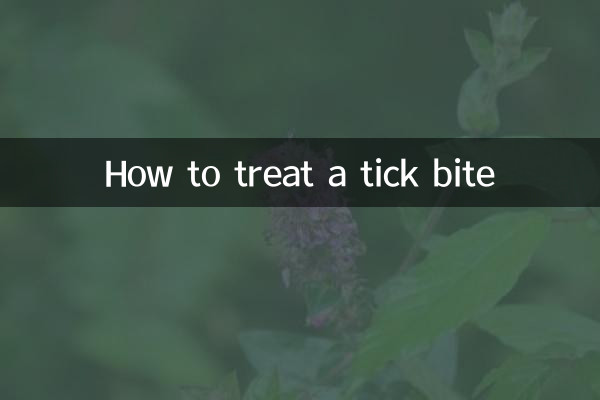How to treat a tick bite
With the increase in outdoor activities in summer, tick bites also occur frequently. Ticks not only suck blood, but may also spread a variety of diseases, such as Lyme disease, forest encephalitis, etc. This article will combine popular topics and hot contents on the Internet for the past 10 days to introduce you in detail the treatment methods after being bitten by ticks, and provide structured data for reference.
1. Emergency treatment steps after tick bites

1.Don't panic after discovering ticks: Do not slap or crush the ticks directly with your hands to prevent their saliva or body fluid from entering the wound.
2.Remove ticks correctly: Use pointed tweezers or a special tick removal tool to clamp the tick head (near the skin) and pull it out slowly vertically upwards. Avoid shaking or rotating left and right to prevent the tick mouthparts from breaking into the skin.
3.Disinfect wounds: Use iodine or alcohol to disinfect the wound and surrounding skin.
4.Save ticks: Place the removed ticks in sealed bags or containers for subsequent testing (if symptoms appear).
2. Observation and treatment after tick bites
1.Observe symptoms: After tick bites, you need to closely observe whether the following symptoms appear within 1 month:
| symptom | Possible related diseases | Suggested measures |
|---|---|---|
| Fever, headache, muscle aches | Lyme disease, forest encephalitis | Seek medical treatment now |
| Erythema spreads at the bite (and erythema) | Lyme disease | Seek medical treatment now |
| Fatigue, swelling of joints | Lyme disease | Medical examination |
2.Drug treatment: If suspected symptoms occur, the doctor may prescribe the following medications according to the situation:
| Drug Type | Commonly used drugs | Applicable |
|---|---|---|
| antibiotic | Doxycycline, amoxicillin | Lyme disease prevention or treatment |
| Antiviral drugs | According to the specific virus type | Viral infections such as forest encephalitis |
3. How to prevent tick bites
1.Outdoor protection:
- Wear light long-sleeved trousers and tighten the legs and cuffs.
- Use an anti-worming agent containing DEET (DEET) or pacaridin.
- Avoid staying in grass and bushes for a long time.
2.Check after going home:
- Carefully check the skin all over the body, especially hidden areas such as the armpits, behind the ears, and groin.
- Take a shower and change clothes in time.
4. Answers to recent hot related questions
According to the hot discussions across the entire network for the past 10 days, the following are some of the most concerned issues for users:
| question | Professional answers |
|---|---|
| How long will it take to get sick after being bitten by a tick? | The incubation period is usually 3-30 days, and most of them appear in 7-14 days. |
| Is it advisable to use fire to roast ticks? | Not advisable, may stimulate ticks to release more pathogens |
| How to deal with pet bites by ticks? | Use pet-specific tick removal tools and consult a veterinarian |
5. Special reminder
1. After biting in high-risk areas (such as forest areas and grasslands), it is recommended to seek medical consultation even if there is no symptoms.
2. Pregnant women and children should pay special attention to it after being bitten and seek medical treatment in a timely manner.
3. Recently, many places have reported that tick activity has increased, so it is necessary to take good protection for outdoor activities.
With the above structured data and detailed instructions, I hope it can help you deal with tick bites correctly. remember:Handle it in a timely and correct manner + closely observe the symptoms + seek medical treatment if necessaryIt is a key three-step process in dealing with tick bites.

check the details

check the details